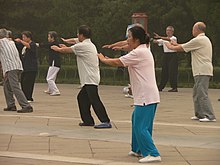
It turns out that doing the series of slow moving movements called Tai Chi reduces blood pressure more than vigorous aerobic exercise. This traditional Chinese exercise also has other benefits: it improves flexibility and balance, as well as cardiovascular and respiratory function.
A recent study found that doing the slow gentle movements and postures of Tai Chi (often called meditation in motion) for one year resulted in greater blood pressure reductions than aerobic exercises in persons with prehypertension. Half of a group of 349 adult volunteers were randomly assigned to Tai Chi for one hour 4 times per week for a year, while persons in the other group were randomly assigned to do aerobic exercises (including climbing stairs, jogging, brisk walking, and cycling) with the same frequency.
After one year, persons in both groups had lower blood pressure than at the start of the study, but in the Tai Chi group it was about 7.01 mmHg lower compared to 4.61 mmHg lower in the aerobic exercise group.
Prehypertension is blood pressure that is slightly higher than normal (between 120/80 and 139/89 mmHg), but not yet hypertension. In the study, the researchers also found that fewer persons from the Tai Chi group progressed to hypertension. A win-win.
The researchers of this study concluded that Tai Chi is a safe, moderate-intensity, mind-body exercise, which is suitable for persons of all ages and physical conditions. By the way, other studies also found that doing Tai Chi reduces blood pressure - as early as 12 weeks.
From NPR: Tai chi reduces blood pressure better than aerobic exercise, study finds
Tai chi, a traditional, slow-moving form of Chinese martial art, is known to increase flexibility and improve balance. Now, new research suggests it's better than more vigorous aerobic exercises for lowering blood pressure in people with prehypertension. ...continue reading "Study Found Tai Chi Reduces Blood Pressure Better Than Aerobic Exercises"
